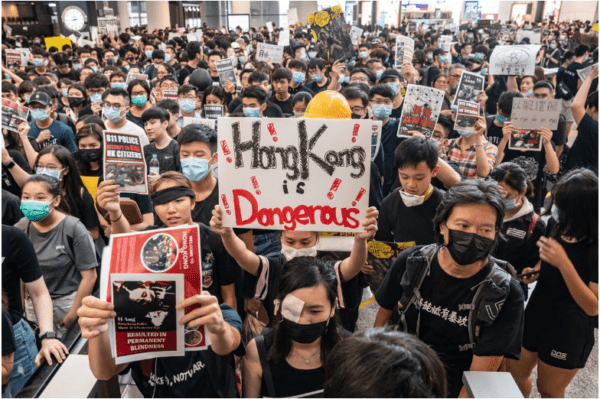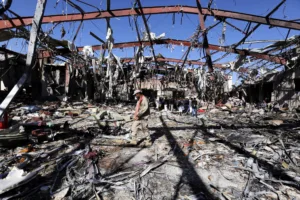On Tuesday, 19 March, the Legislative Council of the Hong Kong Special Administrative Region (HKSAR) unanimously passed the ‘Safeguarding National Security Bill’ – locally known as ‘Article 23,’ a move that has drawn widespread criticism from the United Nations, rights groups, and a group of “90 international parliamentarians and public figures.”
The legislation’s entry into force follows and expands upon the similarly controversial ‘National Security Law’ (NSL), imposed on Hong Kong by China in June of 2020. The former bill, a direct response to protests in 2019 sparked by a proposed introduction of a controversial extradition bill that rocked the former British colony, aimed to ensure “the resolute, full, and faithful implementation of the policy of ‘One Country, Two Systems,’” “safeguard national security,” as well as “maintain prosperity and stability of the Hong Kong Special Administrative Region.” Both the NSL and Article 23 have faced fierce domestic opposition within Hong Kong due to what is perceived as an overreach from the government of civil liberties and human rights, concerns echoed by international organizations such as Human Rights Watch, who have described the measures as efforts to “transform a mostly free city into one dominated by Chinese Communist Party oppression.”
While Article 23 claims within its preamble that “human rights are to be respected and protected (…) including the freedoms of speech, of the press and of publication, of assembly, of procession and demonstration,” it follows many of the principles of the 2020 NSL, further codifying definitions and punishments for acts that are deemed as harmful to national security, both of the HKSAR, and the People’s Republic of China (PRC) as a whole. The law also institutes five additional criminal categories, namely “treason, insurrection, offences in connection with state secrets and espionage, sabotage and endangering national security, and external interference.”

Article 23 aims to crack down on a variety of pre-determined offenses against the State, including “colluding with external forces,” which is defined as when a “person participates in an activity planned or otherwise led by an external force,” including, “a government of a foreign country; the authority of a region or place of an external place,” or “an international organization.” The ordinance also targets treason, which is defined as when a Chinese citizen “joins an external armed force that is at war with China, levies war against China,” or “instigates a foreign country or an external armed force to invade China with force,” with punishments of up to 14 years imprisonment.
Another focus of Article 23 is the offense of insurrection, the clauses of which specify that “if a person with intent to endanger the sovereignty, unity, or territorial integrity of China or the public safety of the HKSAR as a whole (…) does a violent act in the HKSAR, the person commits an offense and is liable on conviction on indictment to life imprisonment.” With regards to the issue of mutiny, the bill specifies that “a person who knowingly incites a member of a Chinese armed force to abandon [their] duties and [allegiance] to China (…) commits an offence and is liable on conviction on indictment to life imprisonment.” Furthermore, the ordinance brings into question “acts with seditious intention,” performed with the “intention to bring a Chinese citizen, Hong Kong permanent resident or a person in the HKSAR into hatred, contempt or disaffection against the following system or institution,” including “the fundamental system of the state established by the Constitution of the PRC,” as well as a number of “offices of the Central Authorities in Hong Kong.”

Article 23 drew near-immediate scrutiny from the United States of America (U.S.); Secretary of State Antony Blinken expressed “deep concern” over the law’s “vaguely defined provisions.” A statement from the European Union echoed worries over the “potential impact on the rights and freedoms of the people of Hong Kong,” adding that the newly passed legislation “also raises questions about Hong Kong’s long-term attractiveness as an international business hub.” The Foreign Secretary of the United Kingdom, Lord David Cameron, was similarly quick to criticise the measure, saying the law would “further damage rights and freedoms” and “entrench a culture of self-censorship.” The ordinance also came under fire from the United Nations High Commissioner for Human Rights, Volker Turk, who said in a statement that “it is alarming that such consequential legislation was rushed through the legislature through an accelerated process, in spite of serious concerns raised about the incompatibility of many of its provisions with international human rights law.” He added that “this ambiguity (of provisions) is deeply troubling, given its potential misuse and arbitrary application, including to target dissenting voices, journalists, researchers, civil society actors and human rights defenders.” Former Hong Kong lawmaker Nathan Law, now living in exile in the U.K., warned that the legislation brings the region “one step closer to the system of mainland China.”
Beijing’s foreign affairs commissioner countered criticism of Article 23 by accusing the U.K. of being “hypocritical and exercising double standards,” with the Chinese Embassy in London denouncing Lord Cameron’s remarks as “a serious distortion of the facts.” Indeed, John Lee Ka-chiu, Chief Executive of Hong Kong, praised the law, saying it would help the region “effectively prevent and suppress and punish espionage activities, conspiracies and traps from foreign intelligence agencies, and infiltration and sabotage by hostile forces.” As China continues attempts to secure its position as a global hegemon, Beijing’s push for dominance and attempts to cement centralized control are likely to only increase, raising fears of the future of Taiwan.
Cover Image: Hong Kong’s Pro-Beijing Parliament Unanimously Passed Article 23 on 19 March 2024







